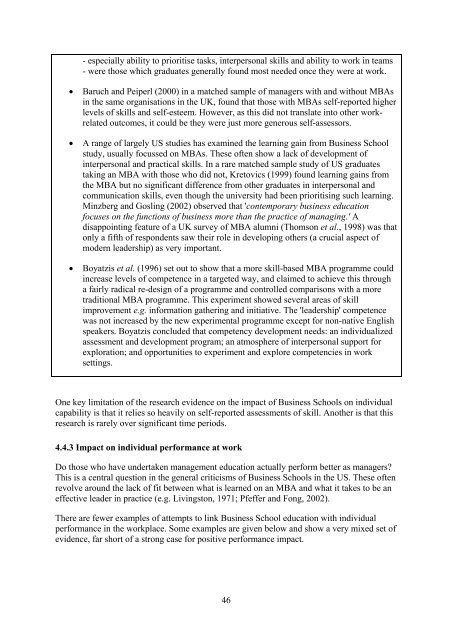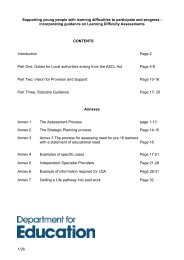The Development of Management and Leadership Capability and its ...
The Development of Management and Leadership Capability and its ...
The Development of Management and Leadership Capability and its ...
You also want an ePaper? Increase the reach of your titles
YUMPU automatically turns print PDFs into web optimized ePapers that Google loves.
- especially ability to prioritise tasks, interpersonal skills <strong>and</strong> ability to work in teams<br />
- were those which graduates generally found most needed once they were at work.<br />
• Baruch <strong>and</strong> Peiperl (2000) in a matched sample <strong>of</strong> managers with <strong>and</strong> without MBAs<br />
in the same organisations in the UK, found that those with MBAs self-reported higher<br />
levels <strong>of</strong> skills <strong>and</strong> self-esteem. However, as this did not translate into other workrelated<br />
outcomes, it could be they were just more generous self-assessors.<br />
• A range <strong>of</strong> largely US studies has examined the learning gain from Business School<br />
study, usually focussed on MBAs. <strong>The</strong>se <strong>of</strong>ten show a lack <strong>of</strong> development <strong>of</strong><br />
interpersonal <strong>and</strong> practical skills. In a rare matched sample study <strong>of</strong> US graduates<br />
taking an MBA with those who did not, Kretovics (1999) found learning gains from<br />
the MBA but no significant difference from other graduates in interpersonal <strong>and</strong><br />
communication skills, even though the university had been prioritising such learning.<br />
Minzberg <strong>and</strong> Gosling (2002) observed that 'contemporary business education<br />
focuses on the functions <strong>of</strong> business more than the practice <strong>of</strong> managing.' A<br />
disappointing feature <strong>of</strong> a UK survey <strong>of</strong> MBA alumni (Thomson et al., 1998) was that<br />
only a fifth <strong>of</strong> respondents saw their role in developing others (a crucial aspect <strong>of</strong><br />
modern leadership) as very important.<br />
• Boyatzis et al. (1996) set out to show that a more skill-based MBA programme could<br />
increase levels <strong>of</strong> competence in a targeted way, <strong>and</strong> claimed to achieve this through<br />
a fairly radical re-design <strong>of</strong> a programme <strong>and</strong> controlled comparisons with a more<br />
traditional MBA programme. This experiment showed several areas <strong>of</strong> skill<br />
improvement e.g. information gathering <strong>and</strong> initiative. <strong>The</strong> 'leadership' competence<br />
was not increased by the new experimental programme except for non-native English<br />
speakers. Boyatzis concluded that competency development needs: an individualized<br />
assessment <strong>and</strong> development program; an atmosphere <strong>of</strong> interpersonal support for<br />
exploration; <strong>and</strong> opportunities to experiment <strong>and</strong> explore competencies in work<br />
settings.<br />
One key limitation <strong>of</strong> the research evidence on the impact <strong>of</strong> Business Schools on individual<br />
capability is that it relies so heavily on self-reported assessments <strong>of</strong> skill. Another is that this<br />
research is rarely over significant time periods.<br />
4.4.3 Impact on individual performance at work<br />
Do those who have undertaken management education actually perform better as managers?<br />
This is a central question in the general criticisms <strong>of</strong> Business Schools in the US. <strong>The</strong>se <strong>of</strong>ten<br />
revolve around the lack <strong>of</strong> fit between what is learned on an MBA <strong>and</strong> what it takes to be an<br />
effective leader in practice (e.g. Livingston, 1971; Pfeffer <strong>and</strong> Fong, 2002).<br />
<strong>The</strong>re are fewer examples <strong>of</strong> attempts to link Business School education with individual<br />
performance in the workplace. Some examples are given below <strong>and</strong> show a very mixed set <strong>of</strong><br />
evidence, far short <strong>of</strong> a strong case for positive performance impact.<br />
46
















